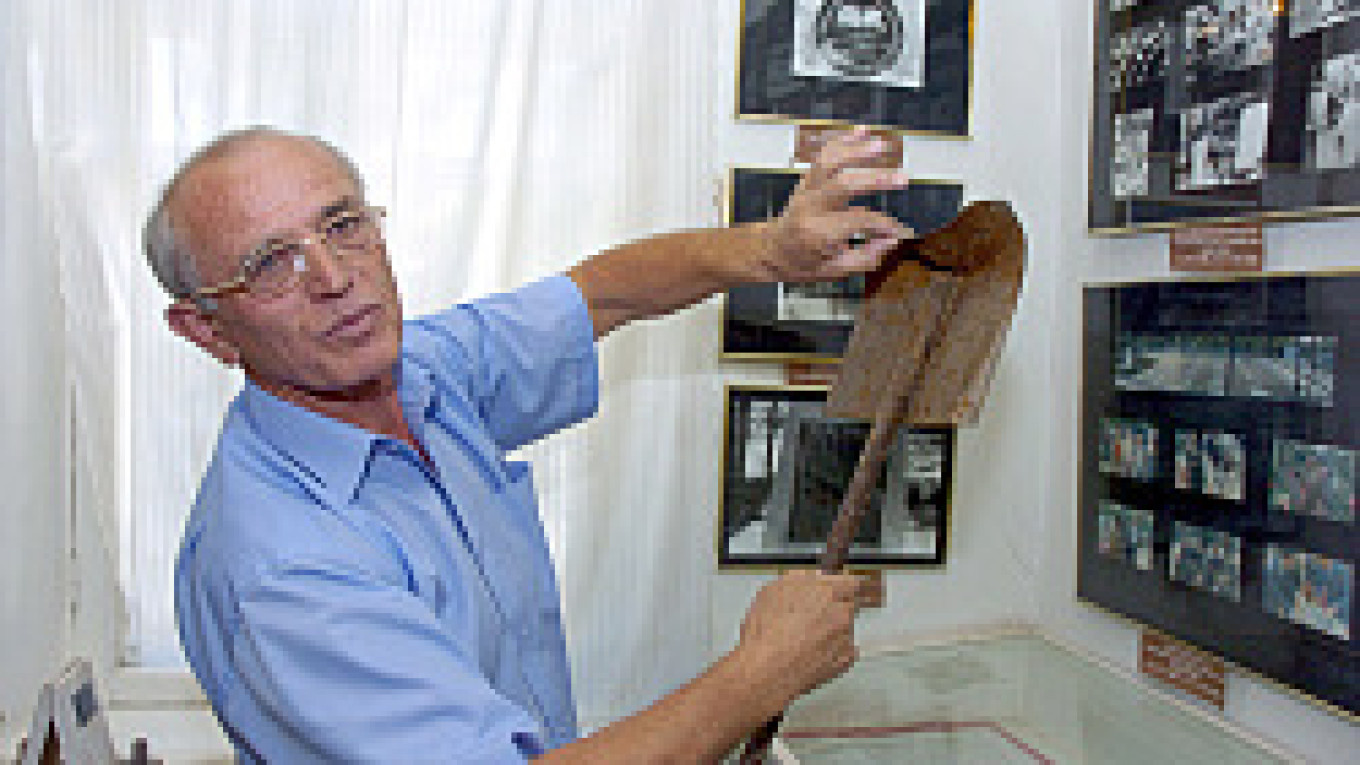It's also a testament to the role played by thousands of Japanese soldiers and officers who were taken prisoner in the last days of World War II and forced to labor in Soviet Uzbekistan.
In addition to the 1947 theater, the captive Japanese built another theater, three plants, a 120-kilometer high-tension transmission line and a hydropower plant. The Soviet press lauded the construction as a heroic deed of the Soviet people, never mentioning the captive laborers who were never paid.
"It was a sealed page in Soviet history," said amateur historian Jalil Sultanov, who runs a private museum dedicated to the Japanese POWs in Uzbekistan. "Information on the prisoners was declassified only in 1992."
Though the Imperial Japanese Army was not engaged in warfare on Soviet territory apart from brief skirmishes on the Korean border, in late 1945 more than half a million Japanese soldiers were herded to the Soviet Union to rebuild ruined cities.
Almost 24,000 of them ended up in Uzbekistan, Sultanov says. Some were in their teens.
"They were small, young and crying," recalled Jamilya Razzakova, 72, an Uzbek woman who still lives next to the barracks the POWs built for themselves in southern Tashkent.
The barracks survived the devastating 1966 earthquake that leveled half the city, and they still serve as apartment buildings, whose residents are proud of the thick, soundproof walls and oddly curved ceilings.
While about one-fifth of the POWs interned in the Far East and Siberia perished in the late 1940s, in Uzbekistan the death toll did not exceed 3 percent -- a total of 817 men buried in 10 Uzbek cities, Sultanov said, quoting statistics from the Soviet Defense Ministry.
"If civilians treated German prisoners like enemies, the Japanese were looked upon as tired wanderers far from home," he said.
He tells stories of Uzbeks whose own families often lacked food and bare necessities, but would send a bucket of apples, a loaf of bread or a bar of soap to the Japanese barracks.
"Helping a wanderer is a Muslim virtue equal to helping an orphan," he said.
A building engineer by training, Sultanov has been studying Japanese-Uzbek relations since 1978. He said he was inspired by a verse in the Quran saying that God divided men so that nations could get to know one another.
He opened his museum in 1998 in his house on the outskirts of Tashkent. Two rooms are filled with copies of documents, pictures and artifacts, such as a metal spoon fashioned by a Japanese soldier.
The museum is next to a cemetery where 79 graves of Japanese POWs lie alongside those of German POWs and local Muslims.
The Soviet government ordered that 15 POW cemeteries be liquidated in 1958 -- "Graves should be razed to the ground, signs and fences destroyed," the order instructed -- but pious Uzbeks were afraid to destroy graves, Sultanov said.
Until 1978, neither the former POWs nor their relatives were allowed to visit the cemeteries. A blurred black-and-white picture from Sultanov's collection shows the first Japanese guests: a family headed by a bespectacled patriarch, their heads bowed down in reverence.
By 2002, all Japanese cemeteries in now independent Uzbekistan had been rebuilt with Japanese government aid.
A metal sign with the words "Eternal Peace and Friendship" marks the entrance to the Tashkent cemetery, and sakura saplings surround new granite tombstones engraved with the soldiers' names and birthplaces.
A group of Japanese Shinto monks arrived here to consecrate the cemetery, which has become a must-see destination for Japanese delegations and tourists.
A Message from The Moscow Times:
Dear readers,
We are facing unprecedented challenges. Russia's Prosecutor General's Office has designated The Moscow Times as an "undesirable" organization, criminalizing our work and putting our staff at risk of prosecution. This follows our earlier unjust labeling as a "foreign agent."
These actions are direct attempts to silence independent journalism in Russia. The authorities claim our work "discredits the decisions of the Russian leadership." We see things differently: we strive to provide accurate, unbiased reporting on Russia.
We, the journalists of The Moscow Times, refuse to be silenced. But to continue our work, we need your help.
Your support, no matter how small, makes a world of difference. If you can, please support us monthly starting from just $2. It's quick to set up, and every contribution makes a significant impact.
By supporting The Moscow Times, you're defending open, independent journalism in the face of repression. Thank you for standing with us.
Remind me later.


